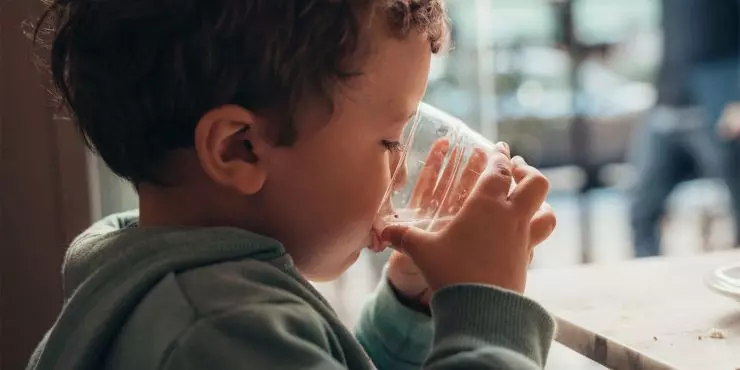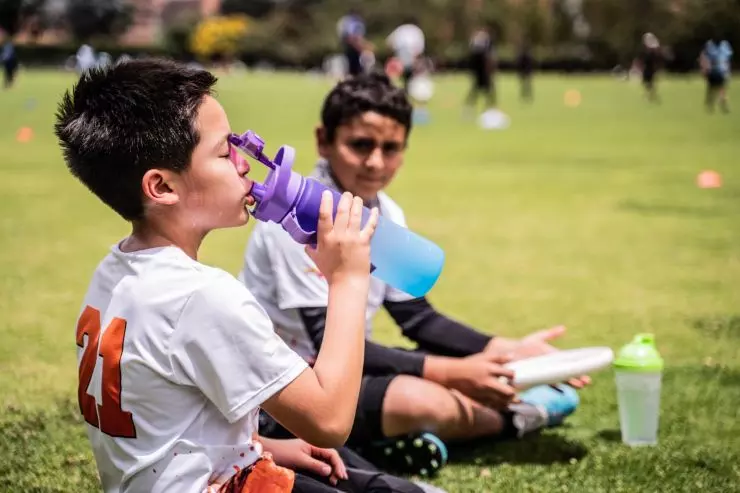
We all know that summer is a joyous time for everyone, especially our children, as they say goodbye to the classroom and hello to the sunny outdoors. While we encourage children to get outside and get moving, it's essential that, as parents, we are mindful of keeping our children sun-safe and hydrated during this time. As they run and play in hotter temperatures, they may sweat more, making hydration even more important. Children's bodies are also more sensitive to temperature changes and can dehydrate faster than adults. Proper hydration, therefore, is crucial for maintaining their energy levels, supporting growth, and ensuring overall health.
Keeping Your Kids Hydrated – Why it's Important
Children's bodies are about 60%-70% water, which is higher than that of adults, meaning they need more water. Additionally, their metabolisms are higher, increasing their need for water. Their bodies also lose water more quickly, making them more susceptible to dehydration, especially in hot weather or during physical activity.
Here are some reasons hydration in children is important:
- Regulating body temperature – Water helps dissipate heat and keep the body cool, especially during hot summer days when children play outside.
- Supporting digestion – Adequate hydration aids digestion and prevents constipation, a common issue that can be exacerbated by dehydration.
- Maintaining energy levels – Dehydration can lead to fatigue and decreased physical performance, making it harder for kids to enjoy their favorite activities.
- Promoting overall health – Water is essential for cellular function, nutrient transport, and waste removal, all of which are critical for a child's development and well-being.
Recognizing Dehydration in Kids – The Symptoms
- Dry mouth and lips
- Decreased urination
- Dark urine
- Fatigue and irritability
- Dizziness or light-headedness, which may be a sign of severe dehydration, which requires immediate attention.
Tips to Keep Kids Hydrated
Encourage Regular Water Intake: Make drinking water a routine part of your child's day. Encourage them to drink water before, during, and after playtime or physical activity. Setting a timer or using apps designed to remind kids to drink water can be helpful.
Make Water Fun: Use colorful cups, straws, or water bottles to make drinking water more appealing. You can also infuse water with natural flavors like slices of lemon, lime, cucumber, or berries, making it more enticing without adding sugar.
Set an Example: Children are more likely to drink water if they see you doing it. Make a habit of drinking water together as a family, and keep a jug of water on the table during meals to encourage everyone to drink.
Offer Hydrating Foods: Incorporate some water-rich fruits and vegetables into their diet. Options like cucumbers, oranges, strawberries, watermelon, and celery are nutritious and help keep kids hydrated. Frozen fruits and homemade popsicles can also be fun treats that contribute to their water intake.
Avoid Sugary Drinks: Limit intake of sodas, sugary juices, and energy drinks. These can contribute to dehydration and are less effective at quenching thirst. Additionally, sugary drinks can lead to other health issues, such as obesity and dental problems.
Provide Sports Drinks When Necessary: Electrolyte-replenishing drinks can be beneficial for older children engaged in intense physical activities or sports. However, due to their sugar content, these should be consumed in moderation. Consider offering diluted sports drinks or coconut water as a healthier alternative.
Schedule Water Breaks: If your child is playing outside or participating in sports, schedule regular water breaks every 20-30 minutes. Coaches and caregivers should also be aware of the importance of hydration and incorporate these breaks into the activity schedule.
Keep Water Accessible: Always have water available, whether you're at home, in the car, or at the park. Portable water bottles are a great way to ensure your child can always access water. Encourage them to carry a water bottle with them during the day.
Create a Hydration Chart: For younger kids, a fun chart where they can track their water intake with stickers or marks can be motivating. This visual representation can encourage them to drink more water throughout the day.

Special Considerations for Babies and Toddlers
Breastfed Babies: Breast milk provides adequate hydration for infants under six months. However, during very hot weather, you may need to offer more frequent feedings to keep them hydrated.
Formula-Fed Babies: Similarly, formula provides sufficient hydration, but extra feeds might be necessary in hot conditions. Always consult your pediatrician before making any significant changes to feeding routines.
Introducing Water: For most babies, once babies start solid foods (around six months), you can begin offering small amounts of water in addition to their regular feedings. Use a sippy cup or a small bottle to introduce water gradually.
When to Seek Medical Help
If you notice signs of severe dehydration, such as extreme thirst, very dark urine, dry skin, rapid breathing, or confusion, seek medical attention immediately. Severe dehydration can be dangerous and may require medical intervention, such as IV fluids. Always err on the side of caution and consult a healthcare professional if you are unsure about your child's hydration status.
Embrace the Sun and the Water
Keeping kids hydrated during the summer is crucial for their health and well-being. By making water intake a regular and fun part of their daily routine, you can help prevent dehydration and ensure your children enjoy their summer activities safely. Remember, hydration doesn't just come from water; many foods, particularly fruits and vegetables, can contribute to their overall fluid intake.
For more information, you can visit resources such as the American Academy of Pediatrics (AAP) or the Centers for Disease Control and Prevention (CDC). If you have any concerns or questions about your child's hydration needs, don't hesitate to contact your pediatrician for personalized advice.
Stay hydrated, and have a wonderful summer!